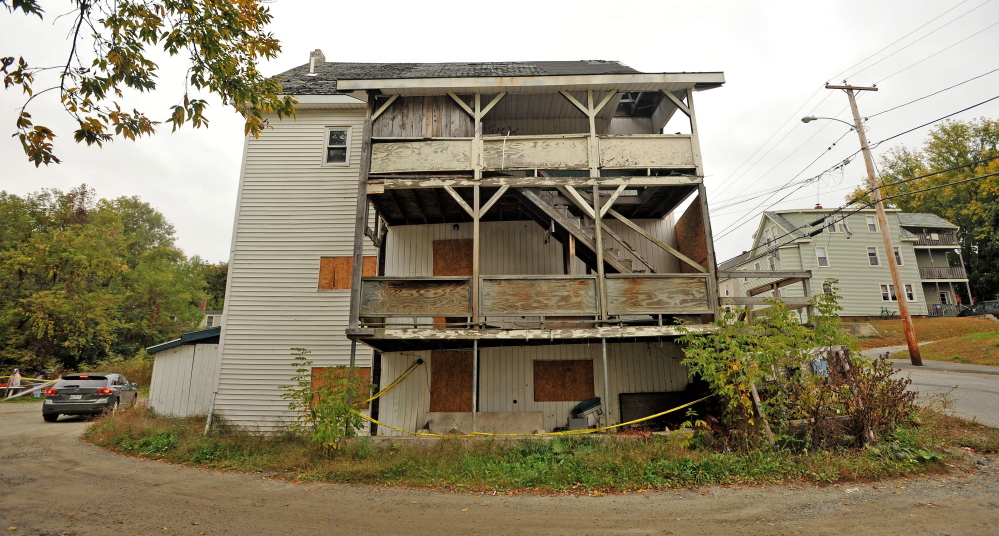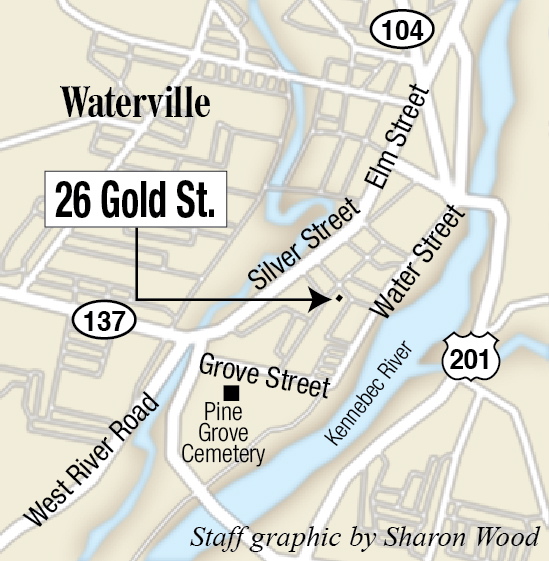WATERVILLE — The number of complaints to the city code enforcement office has skyrocketed over the last 15 years, with residents reporting problems including dilapidated property, landlords who won’t fix code violations and neighbors whose grass is too tall.
Yet the code office’s staff size has remained the same — one full-time person.
The city plans to ease the pressure by hiring a second full-time employee in the coming weeks to help Code Enforcement Officer Garth Collins deal with the workload, which has increased since the city enacted a property maintenance ordinance 15 years ago and the housing crisis and economic recession fueled the situation.
Creating the new position has been a long time coming. For years, Collins, councilors and other city officials cited a need for another person to work in the office, but the city did not hire one. This year, however, the council voted to hire a full-time code enforcement employee whose job description will be similar to Collins’, but Collins will train the new hire.
City Manager Michael Roy said the number of complaints to the city about delinquent property has presented the biggest surge in demand on the code enforcement office in recent years — from serious building code violations to neighbors complaining that a building owner is not adhering to the property maintenance code. Home foreclosures also have spiked in the last few years, adding to enforcement complaints.
“I think it’s three things — the foreclosures, the fact that we drew up the property maintenance ordinance and the properties are getting older,” Roy said.
Roy’s recent effort to beef up staffing in the busy code office prompted controversy and put the office’s workload in the spotlight. Roy cut City Planner Ann Beverage’s hours per week from 40 to 20 and eliminated her benefits with a plan to hire someone full time who would work 20 hours in her office and 20 in Collins’ office. Beverage has worked for the city for more than 26 years.
Roy decreased Beverage’s hours Jan. 1. He said Beverage’s job did not warrant 40 hours and the code office had more work than one person could handle. As city planner, Beverage serves as a staff member to the Planning Board, while also dealing with developers and their applications and answering questions from the public.
Beverage said she feared decreasing her hours and hiring a new person would result in elimination of her job. Some councilors at a Jan. 20 council meeting questioned the proposal, and the council voted 5-2 to postpone a decision on the new position. Then, on Feb. 3, the council voted 5-0 to hire a full-time code enforcement position and keep Beverage on for 20 hours a week.
Roy and Collins say the city expects to hire someone for the $45,000-per-year post in the near future. The city’s code enforcement office costs about $100,000 to operate annually, and it collects $80,000 to $200,000 a year in building, plumbing, electrical, sign and other fees, Roy said.
COMPLAINTS SOAR
Collins remembers exactly when complaints from homeowners in residential neighborhoods and tenants in rental units started to increase.
It was 15 years ago, and the city recently had enacted a property maintenance code requiring people to clean up trash and junk, keep their grass mowed to a length of less than 10 inches and remove junk cars.
Around that time, apartment building tenants started complaining about electrical, plumbing and heating problems.
Collins had just started working for the city.
“Things just went crazy,” Collins said. “It went nuts because these people were in lower-rent districts, and they’d use every service available to them without doing anything themselves. I average 300 or 400 calls a year from tenants complaining about problems.”
In an interview in his office on the third floor of The Center next to City Hall, Collins said he responds to every complaint, either by going in person or making phone calls to resolve the issue.
Many times, Collins said, a tenant calls to complain about a problem in an apartment and when he contacts the landlord, he learns that the tenant has not been paying the rent and has complained about a nonexistent problem. When Collins suggests meeting with the landlord to resolve the problem, the tenant will back off from the complaint, he said.
“Over the years I developed a technique and figured out the best way to deal with those things,” he said. “I screen folks.”
Lindsey Burrill, president of the Central Maine Apartment Owners Association, which represents more than 600 apartment owners from Augusta to Bangor, said about 80 percent of tenants are good, while the other 20 percent cause problems.
“Garth is wonderful at reading the situation and putting two and two together,” she said. “I can’t say enough about Garth Collins. He is such an asset.”
PROBLEM PROPERTIES
One of the biggest headaches Collins faces is working with lending institutions that take over foreclosed property and don’t want to put money into it to solve problems that develop, he said.
“They ignore us. They will take every angle they can out of doing anything responsible,” he said.
Collins estimates that 40 to 50 foreclosed properties in the city that are vacant, out of a total of about 7,000 buildings.
When Collins first started working for the city, it was not an issue. It became a problem “seven or eight years ago when houses started dropping like leaves from a tree,” he said.
He emphasized that local banks aren’t the problem when the city deals with bank-owned property.
“Mortgage lending companies, those people are different to deal with, and they’re usually out of state,” he said.
When property owned by those companies generates a lot of complaints, Collins said, he calls the owners but typically gets no satisfaction.
A good example is a vacant apartment building at 26 Gold St. in the South End of Waterville that the city recently tore down at a cost of about $10,000. Neighbors complained about the building’s shingles blowing off the roof, outdoor porches crumbling and people breaking in. They also complained the property had become a magnet for bedbugs and rodents.
Every time the city tried to contact the owner to get the problems solved or tear the building down, the owner would say it had been sold to a new owner, according to Collins. He said the property changed hands several times.
The current owner is Lakeside Portfolio Management, of Fort Lauderdale, Fla., according to both Collins and City Assessor Paul Castonguay.
“We condemned the property,” Collins said. “We went through state law. Under state law, we were able to take care of a dangerous building. It’s atrocious. We started with this three or four years ago, saying it was dangerous and it was declared dangerous and we wanted it torn down. They sold it and we had to start it all over again. We went through the whole process and notified the owner, and they really didn’t care.”
He said some companies buy 500 or 600 “shacks” as part of their portfolio, hoping to make money on at least some of them.
“They do it all over the country. It actually sprung from foreclosures,” Collins said. “We ended up tearing Gold Street down, cleaning it up at the expense of taxpayers. We sent a notice to the last owners, saying, ‘You owe us this money.’ They refused to pay it. We’ll end up with the property.”
The Gold Street property was bought by a man from Melrose, Mass., in 2003 from a Waterville couple that had owned the building since 1985, according to records at the Kennebec County Registry of Deeds. The mortgage lender foreclosed in 2011, and ownership of the property was transferred five times over the next two years, including two transfers recorded on the same day. Lakeside Portfolio Management of Florida acquired 26 Gold St. from a Texas corporation and transferred ownership to American Homeowners Preservation LLC of Chicago.
City Solicitor William Lee said he heard that a property transfer might happen, so he made sure the notice of the hearing went to the registry. Ultimately, American Homeowners is responsible for dealing with the city in the case, he said.
Crystal Carver, who represents American Homeowners and works in senior litigation resolution, did not return a call seeking comment. Lee’s office dealt with Carver in the Gold Street case.
“We’re covered. They can’t say, ‘Well, gee whiz — we don’t know about it,'” Lee said.
FORECLOSURE ISSUES
Burrill, the Apartment Owners Association president, agrees with Collins that larger companies are “sort of disguising themselves in purchase and transfer of these properties.”
“That’s not a very common thing here,” she said. “It certainly is happening in town, but it’s not the norm.”
Roy said that the number of foreclosures in the city in the last six years, since the recession, is higher than in the previous six, though the city does not have statistics on the number of foreclosures.
“Compared to 15 years ago, it’s very hard to say,” he said. “We don’t have numbers back that far.”
Meanwhile, neighbors complain about foreclosed or otherwise vacant properties.
“Violette Avenue, Cool Street — people call you all the time,” Collins said. “‘The grass is tall; it attracts robbers.’ ‘I want code enforcement to come in.’ We don’t have funds for that. You can’t take people to court because they don’t mow the lawn. On the foreclosed properties, we ask people to be patient. It will change.”
Collins knows too well the complexities involved in trying to get a company to fix a dilapidated property.
Allan Rancourt, president of Kennebec Federal Savings, said many mortgage servicing companies nationwide that are not affiliated with financial institutions try to foreclose on a property and sell it at auction as soon as possible.
The large companies are not interested in fixing buildings, according to Rancourt.
“They’re in it to sell as soon as possible,” he said.
Chances are good that a local code enforcement officer seeking to get a building repaired is not going to be able to get through the chain of command in such companies to find the right person who could discuss fixing a property, Rancourt said.
MOST FOLLOW THE RULES
As the city’s code enforcement officer, Collins, 61, is responsible for issuing all building permits, as well as electrical and plumbing permits, sign permits and other items for new and existing homes, businesses, commercial ventures, colleges, hospitals and the like.
“From March until December, I issue two, three, four permits a day on each phase — plumbing, electrical, building. We average about 200 building permits a year, 150 electrical, 150 plumbing.”
He finds that few people do anything that is illegal or dangerous in their projects.
“Most people take good care of what they’re doing,” he said. “I don’t have a problem with contractors whatsoever, electricians. People are extremely good.”
Paul Demers, president of the Maine Building Officials and Inspectors Association, said codes exist to make sure people and property are safe — and that structures are built at least to a minimum standard to protect people.
“The hope is that people build solid structures,” said Demers, who is Kennebunk’s code enforcement officer. “Ninety-eight percent of builders out there are building good-quality structures, easily compliant with the code; but those that aren’t — you hope you catch them. You don’t want anyone to get hurt.”
Collins said he is so busy he doesn’t have time to deal with fire codes. The city’s Fire Department does a lot of that work.
“I’m grateful for Fire Chief Dave LaFountain, because they have a great team over there, and they’ve done a great job with multi-families (apartment houses), making sure they have smoke detectors, et cetera,” Collins said.
If fire officials find violations at a property and the owner will not comply after being told about it, Collins intervenes.
“Code enforcement is not a popular position to be in, but there are some good contractors out there doing jobs that they’re supposed to do,” LaFountain said. “Code enforcement officers look at plans for buildings. If not for a code enforcement officer, you can only imagine what people are building. And my people have to go in and put fires out, so I want to make sure a building stands up with a little fire in it and it doesn’t come down on top of them.”
LaFountain said the world’s first known building code was set by Hammurabi, the man who established Babylon and reigned there from 1792 to 1750 B.C. The code basically says that buildings shall be constructed properly using approved methods, according to LaFountain.
“If you built a building and it fell and killed someone, the builder would be put to death.”
Amy Calder — 861-9247
Twitter: @AmyCalder17
Copy the Story LinkSend questions/comments to the editors.







Success. Please wait for the page to reload. If the page does not reload within 5 seconds, please refresh the page.
Enter your email and password to access comments.
Hi, to comment on stories you must . This profile is in addition to your subscription and website login.
Already have a commenting profile? .
Invalid username/password.
Please check your email to confirm and complete your registration.
Only subscribers are eligible to post comments. Please subscribe or login first for digital access. Here’s why.
Use the form below to reset your password. When you've submitted your account email, we will send an email with a reset code.